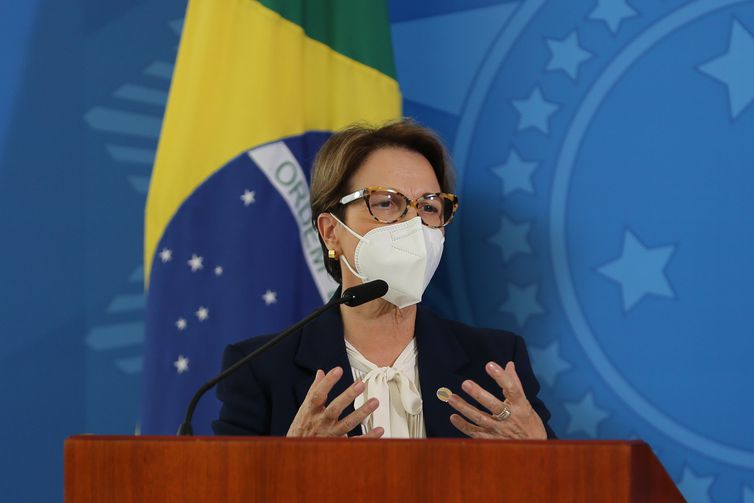Brasília – Brazil’s government will devise a policy to increase its manufacturing of agricultural fertilizer and minimize reliance on imported products. The country relies for some 80% of its fertilizer needs. An inter-ministerial work group was established to address the topic and met on Tuesday, 9, at Palácio do Planalto.
“Brazil has increased its agricultural output every year but enormously rely on imports of phosphorus and potassium. So, this working group was created,” Agriculture minister Tereza Cristina (pictured above) explained. She addressed the press after a meeting with the National Fertilizer Plan group.
“This topic doesn’t concern only the Ministry of Agriculture. It concerns the Ministry of Mines and Energy, as well as Science and Technology. Anyhow, all these ministries under the coordination of the Secretariat for Strategic Affairs will draft a national fertilizer plan involving cheaper manufacturing of domestically made fertilizer to minimize reliance on imported product, and to add competitiveness to our agribusiness,” she added.
Find out more:
- Brazil to roll out national fertilizer plan
- Itaqui Port expansion to drive trade with Arab countries
The work group will convene for 120 days, after which the National Fertilizer Plan will be submitted to President Jair Bolsonaro. Besides ministries, the plan will be drafted with input from officials of the Brazilian Agricultural Research Corporation (Embrapa) and the Attorney General’s Office. Teresa Cristina said the plan will devise an analysis of the fertilizer supply in Brazil and can result, for example, in draft legislation to facilitate fertilizer production in the country.
An initiative that’s under consideration is allowing the exploitation of potassium reserves in the Amazon as well as mineral resources in indigenous lands. According to Admiral Flávio Rocha, who leads the Secretariat for Strategic Affairs and coordinates the work group, the topic will be addressed more in depth. “These two topics are under consideration [exploitation of potassium in the Amazon and mining in indigenous lands]. The first from a more objective perspective, and the latter in a more sophisticated, in-depth way,” he said.
Translated by Guilherme Miranda




